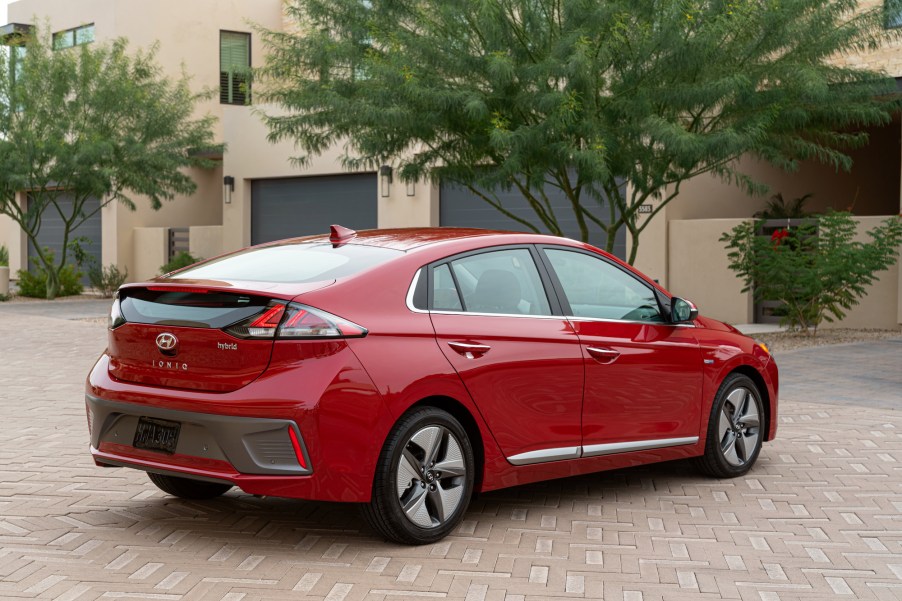
The 2021 Hyundai Ioniq Beat Out Some Stiff Competition on This List
As the pulse of America changes, the demand for electric vehicles is growing at a record pace. Automakers such as Hyundai are working hard to add hybrid, plug-in hybrid, and EVs to their product lineups. Consumers have begun to realize the importance of reducing our reliance on fossil fuels. Cost-savings benefits along with energy tax credits are enticing drivers to consider lowering their carbon footprint.
Hyundai Motor Company is rapidly expanding its electric vehicle line and plans to introduce three new models before 2024. The Korean automaker projects sales of more than a million hybrid and electric units by 2025. In fact, the 2021 Hyundai Ioniq‘s debut is off to a great start and is already beating out the competition on an important list.
The Hyundai Ioniq tops this list of fuel-efficient hybrids
The 2021 Hyundai Ioniq recently grabbed the top spot on U.S. News‘ list “12 Most Fuel-Efficient Hybrid and Plug-In Hybrid Cars.”
With an astounding 58 mpg rating, this hybrid vehicle offers better fuel-efficiency than other cars on U.S. News’ list. The Ioniq starts at an affordable $23,200 and boasts an estimated annual fuel cost of only $600.
The Hyundai Ioniq plug-in hybrid also appears on the list, placing fifth. It gets an estimated 119 MPGe/52 mpg. Its starting price is slightly higher at $26,500, but an available federal tax credit slashes the price by $4,500.
U.S. News recommends the hybrid version over the plug-in hybrid because of reduced fuel costs. For those who typically drive longer distances, the Ioniq Hybrid offers more value and makes better sense.
Ranking number two on the U.S. News list is the Toyota Prius, with a starting price of $28,220 and a range of 133 MPGe/54 mpg. The Hyundai Sonata Hybrid, Toyota Camry Hybrid, and Honda Insight also made it onto the list. Each has fuel costs estimated between $700 and $750 per year and an average of 52 mpg.
The 2021 Hyundai Ioniq at a glance
Although the Hyundai Ioniq is the best in its class for fuel economy, it doesn’t fare well in other areas. U.S. News places it ninth overall among hybrid and electric cars.
The Ioniq Hybrid offers lackluster acceleration, taking almost 10 seconds to go from 0 to 60 mph. The cramped back seat lends to an uncomfortable ride for passengers, but 226.5 cubic feet of cargo capacity is generous for its class.
However, U.S. News notes, “the Ioniq’s unimpressive ride quality, long stopping distances, and limited engine power detract from its appeal.”
Meanwhile, MotorTrend likes the Ioniq and selected it as the number one choice among compact hatch hybrids with an overall score of 8.5 out of 10. The publication recommends the hybrid hands down, saying, “with superb fuel economy and good overall execution, the Ioniq is a worthwhile consideration for hybrid shoppers.”
The best choice for fuel efficiency
The 2021 Hyundai Ioniq Hybrid packs a 1.6-liter inline-four engine, a 32-kW electric motor, and a 1.56-kWh battery. This setup, paired with a six-speed dual-clutch automatic transmission, puts out 139 hp.
The fact that the Ioniq beat the longtime class-leading Toyota Prius is impressive in and of itself. But the Hyundai’s ability to travel an incredible 58 mpg is catching consumers’ and experts’ attention. It seems the automaker has figured out the secret to producing efficient, affordable hybrid vehicles, and it’s not going unnoticed.
There’s no debating that for the best fuel efficiency, the Hyundai Ioniq Hybrid is the ride of choice.


